Jim Brosnan: Visionary author and pitcher
Jim Brosnan pitched for the Chicago Cubs, the Chicago White Sox, Cincinnati Reds and St. Louis Cardinals. He was a fearless craftsman. He once struck out Willie Mays three times in one game. Between 1956 and 1963 Mr. Brosnan compiled a lifetime ERA of 3.54. He was also a splendid writer.
In the summer of 2004 I took Mr. Brosnan to a Cubs game at Wrigley Field. Chicago-based publisher Ivan R. Dee had just reissued Mr.Brosnan’s groundbreaking 1959 diary “The Long Season” and 1962’s “The Pennant Race.” These honest accounts of the game and the business of baseball would become the template for best sellers like Jim Bouton’s “Ball Four” and Bill Veeck’s “Veeck as in Wreck.”
Writing is not the best way to make money.
I told him if he played baseball today he would be a multi-millionaire.
“Quitting didn’t bother me,” he said. “I was a writer. I was going to be a writer.”
Conviction is the first step to being a writer. Incongruity is the second step. Humility isn’t bad either. Mr. Brosnan touched all those bases with dignity and eloquence.
Mr. Brosnan died June 28 of complications from a stroke in Park Ridge, according to the July 4 New York Times.com. He was 84. His passing has been ignored by Chicago media.
Mr. Brosnan quietly kept notes on a pad while sitting in the bullpen during a game. He never showed his manuscripts to anybody. Not even his roommates. Besides writing books, Mr. Brosnan wrote book reviews for the New York Times and the Chicago Daily News. For 25 years he was the baseball writer for Boy’s Life magazine. In the spring of 1968 he wrote articles for the Chicago Tribune magazine like “Moe Drabowsky Leads the League in Supernonproductive Outs,” and the eternally hopeful “Bonehead Baseball is Out, Out, Out at Wrigley Field.”
On road trips Mr Brosnan would pack books by Dostoevsky (not Drabowsky) and John Updike. He also carried a blue-gray 1960s portable Olivetti typewriter.
The typewriter broke in early 2004 when it fell off a shelf. He did not own a computer. He did not have e-Mail. Mr. Brosnan said he stopped writing after his typewriter went down. I wish I had made the effort to stay in touch with him.
Mr. Brosnan liked to zig when the others zagged. He was friends with S.I. Hayakawa, who was teaching at the University of Chicago in the mid-1950s. Hayakawa, who died in 1992, moved to San Francisco in 1955 and was later elected to the U.S. Senate from California.
“In 1958 I was with the Reds and we were in San Francisco,” Mr. Brosnan told me as we watched Cubs pitcher Mark Prior (Mr. Brosnan complained about Prior bugging the plate umpire for missing pitches.) “He [Hayakawa] calls me on the telephone and says we’re going to see [jazz great] Earl ‘Fatha’ Hines. He was a big baseball fan, too. I gave him a baseball cap.”
This, of course, is before ball players were addicted to Game Boys.
Mr. Brosnan’s book collection included all of Ogden Nash’s poetry books and the entire 17-volume edition of Mark Twain’s writings, which he inherited from his wife’s family.
In 1958 Mr. Brosnan wrote a diary piece about his season with the Cardinals. He sent the story to a new magazine called Sports Illustrated. An editor at Harper & Row saw the article and asked the pitcher if he could expand his text. “Win or lose, it didn’t make any difference to him,” Mr. Brosnan said. A good editor is about latitude.
And with that, the seeds of “The Long Season” were planted.
The baseball community did not like the book. Cardinals broadcaster Joe Garagiola called Mr. Brosnan a “cooky beatnik.” Mr. Brosnan’s St. Louis manager Solly Hemus offered this blurb: “You think Brosnan’s writing was funny? Wait until you see him pitch.’ Future Hall of Famer Frank Robinson nicknamed Mr. Brosnan “The Professor,” due in part to his Coke-bottle glasses.
In “The Long Season” Mr. Brosnan wrote about scheming with fellow pitcher and future Cub Ernie Broligio on how they would soft toss to each other so they could get some base hits. Mr. Brosnan was called into Commissioner Ford Frick’s office for that passage. Frick wanted to ban “The Long Season.”
Writers loved “The Long Season.” Iconic New York columnist Red Smith wrote, “A cocky book, caustic and candid, and in way courageous…he doesn’t hesitate to name names and employ ridicule like a stiletto.”
Mr. Brosnan was born on the west side of Cincinnati. His Irish father John was a lathe operator at the Cincinnati Milling Machine Co. His German mother Elizabeth was a piano teacher and nurse. Between the ages of 10 and 15 Mr. Brosnan divided his time between ball fields and the library. “I read whatever my mother told me to read,” he told me. “Until I got a hold of Joseph Altsheler’s early 1900s novels. Nowadays, I can’t find him in the Morton Grove, Evanston or Niles library. From him, I learned how to distinguish the good words from the bad words. I learned about voice.”
Mr. Brosnan learned how to develop his conversational, yet direct style. He liked James Thurber. The only baseball-related momento Mr. Brosnan kept in his house was a Thurber sketch of a baseball catcher that he hung in his bathroom. Thurber had invited Mr. Brosnan to be a guest on his Sunday talk show in New York City.
Mr. Brosnan learned new word by playing crossword puzzles.
He liked one sentence paragraphs.
Mr. Brosnan saw the writing in the wall in 1963 when the Reds shipped him to the White Sox for the weirdly named pitcher Dom Zanni. “When I arrived at the airport, [Sox general manager] Ed Short met me and said, “You can’t write here either. Period. I was hoping for a little better welcome than that. I responded with a four-letter word that begins with ‘F.’Hey, by that time I had sold two pieces, one to Atlantic Monthly and the other to Sport magazine.”
In March, 1964 the American Civil Liberties Union intervened and accused the White Sox of violating Mr. Brosnan’s rights. Short offered Mr. Brosnan another contract in the spring of 1964 that included a drop in salary and a formal ban on writing without approval of management.
Mr. Brosnan retired from baseball.
Mr. Bronsan and I stayed for the entire game on a sunny summer afternoon. The old 6’4″ pitcher had trouble standing up for the seventh-inning stretch. He grabbed a box seat for support. He had endured two knee replacement operations. I brought Mr. Brosnan’s “Pennant Race” to the game. I leaned over and read Mr. Brosnan one of my favorite passages:
“To get to [Cincinnati’s] Crosley Field, I usually take a bus through the old, crumbling streets of the Bottoms. Blacks stand on the corners watching their homes fall down. The insecurity of being in the second division of the National League–in the cellar-leaves me. For 25 cents, the bus ride gives me enough humility to get me through any baseball game, or season.”
Mr. Brosnan fidgeted in his seat. He looked away and then looked at me.
“That was one of the best writing days I ever had,” he said of that passage. “I finished that about 5 in the morning. Writing it over and over, trying to get in everything I felt, but also to stick it in somewhere. We were going to play a lot of games.”
Mr. Brosnan saw things in life that others missed.
His measured sense of perception is what made him a gifted pitcher and a precious writer.
Mr. Brosnan’s wife of 62 years– Ann Pitcher–true–died last year. They lived together for 58 years in the same house in Morton Grove. He is survived by children Jamie, Tim and Kimberlee, a brother Michael and four grandchildren.
A memorial visitation will be at Simkins Funeral Home, 6251 Dempster St. Morton Grove, Sunday, July 20th from 1 p.m. until 4 p.m. memorial service. In lieu of flowers, donations to Paralyzed Veterans of America 801 18th St. NW Washington, D.C. 20006.

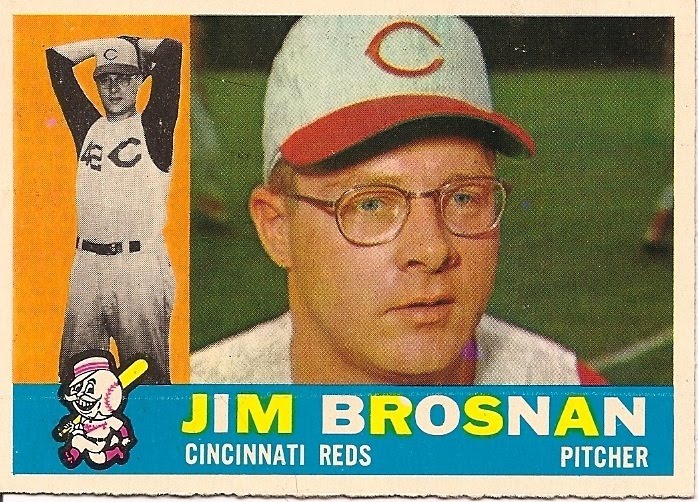
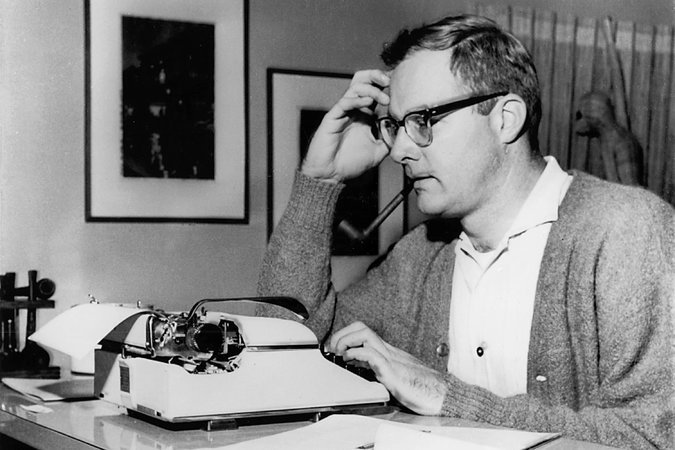
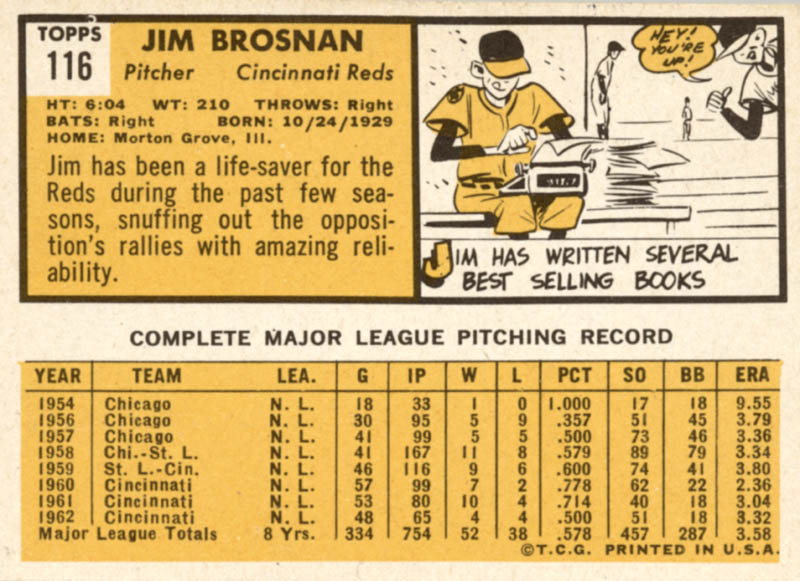
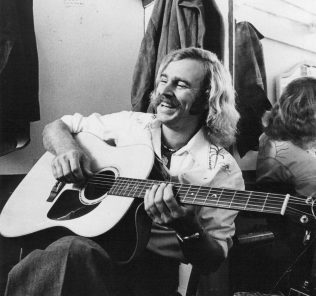
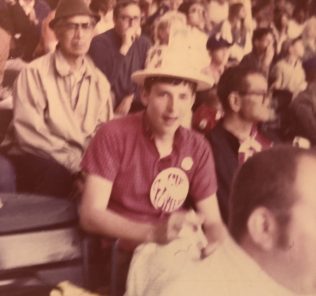
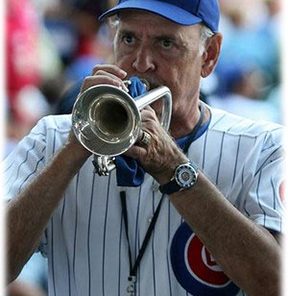
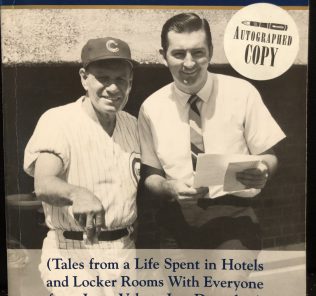
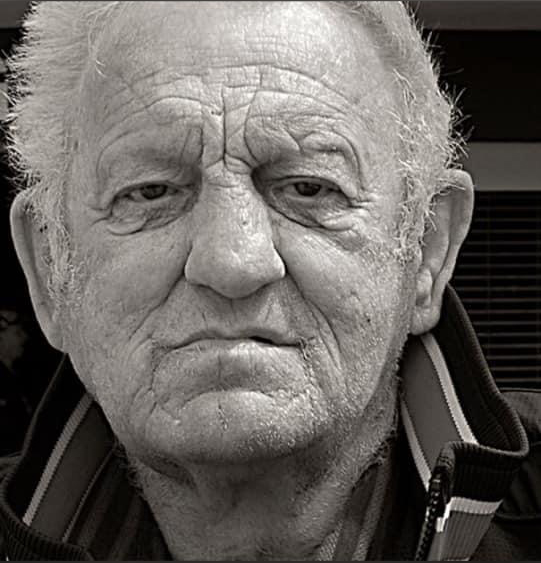

That was a great article. While not one of the greats it is hard to believe the Chicago media missed this.. Pretty shameful to miss on that considering how long he has lived in the area.
Thanks for this, Dave. His passing isn’t even a footnote in Chicago papers and broadcast media. I loved those 2 books, have read them a dozen times each. I loved his ’60s SI and Sport articles, I loved your ’04 piece with him. He autographed and sent back a card I sent to his Morton Grove home a few years back. His writing needs to be more appreciated, and those SI/Sport pieces need to be republished somewhere by someone.
To be fair, news of his passing did not get out right away because arrangements were being discussed and were unresolved for a short while. As you can tell the memorial service was three and a half weeks after his death. However, I am in Cincinnati which is Jim’s hometown and he had his best playing seasons with the Reds as well as his team when both of his bestsellers were published. To this day news of Jim’s passing has not been mentioned in the Cincinnati Enquirer. I sent an email to the Red’s main writer for the CE and he very nicely said “they should have done something on him.” That was last week and still nothing. He has earned better respect. He is no Kardashian. He could read and write!